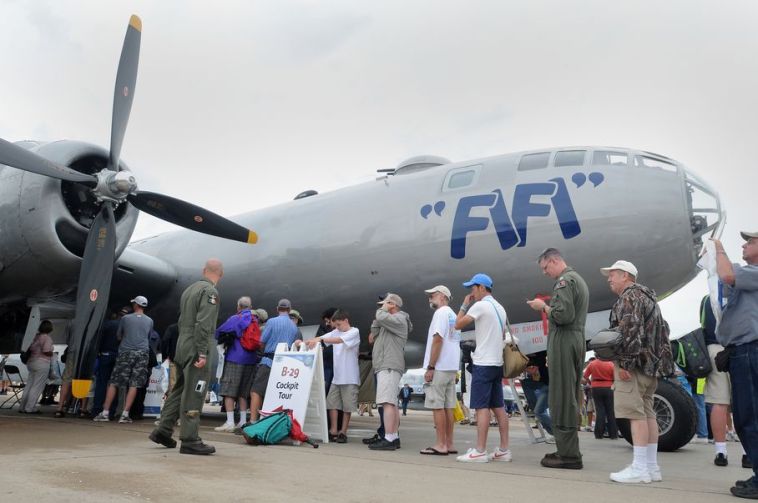MILWAUKEE — One of the nation’s largest air shows begins Monday in Wisconsin, and for each of the 10,000 planes flying in, the federal government will collect about $45 for air traffic control services.
Videos By Rare
The fee has angered pilots, who already pay for air traffic control through a fuel tax, and aviation enthusiasts, who say air shows have been disproportionately hurt by the automatic federal budget cuts that went into effect earlier this spring.
This is the first time the Federal Aviation Administration has charged for air traffic control at AirVenture, which draws hundreds of thousands of people each year. The event is a fundraiser for the nonprofit Experimental Aircraft Association, which paid the $447,000 fee but has petitioned for a refund in federal court. Air show organizers nationwide are watching the fight under the assumption that if EAA loses, they too could soon be asked to pay.
“It will be another blow to an industry that can’t sustain that kind of problem right now,” said John Cudahy, president of the International Council of Air Shows, which represents hundreds of events.
Dozens of air shows were cancelled earlier this year after the military grounded its jet and demonstration teams because of the budget cuts. The teams draw big crowds, and organizers of some shows felt they wouldn’t be able to bring in enough people without them. Some shows that did go on, such as the Vectren Dayton Air Show in Ohio, saw attendance drop two-thirds or more.
AirVenture is among a handful of air shows being charged this year for air traffic control. Most include fly-ins, in which pilots arrive in their own planes, and have heavier air traffic than shows where people come by car or public transportation. A small fly-in could involve 100 or so pilots gathering at an airport for a pancake breakfast. Large ones, like AirVenture, involve thousands of planes coming and going over a week.
The FAA plans to provide 87 air traffic controllers and supervisors for AirVenture. Spokeswoman Elizabeth Isham Cory said the automatic federal budget cuts forced it to seek payment for the cost. The agency said previously it had to cut $384 million from its budget by Sept. 30.
John Leenhouts, president and CEO of Sun ‘n Fun Inc. in Lakeland, Fla., said it received notice about three weeks before its April event that it would have to pay more than $200,000 for air traffic control services. By that time, Sun ‘n Fun and its partner organizations — including aircraft, engine and aviation equipment manufacturers — had invested about $4 million in the event.
“So there’s no turning it off, you have to do it,” said Leenhouts, a former Navy pilot.
The Florida Restaurant and Lodging Association donated $125,000 in recognition of the event’s $55 million impact on the state economy, he said. But Sun ‘n Fun, a nonprofit focused on aviation education, is still struggling to pay the rest of the tab.
“We cannot do scholarships or even put together some programs for kids to learn to fly,” Leenhouts said.
EAA officials fear they will be in a similar position. Like Sun ‘n Fun, AirVenture is a fundraiser for aviation education programs, and EAA board chairman Jack Pelton said the unexpected 7 percent increase in costs means less will be left for those charitable efforts.
It is a particularly bitter pill because the federal budget that went into effect Oct. 1 included money for air traffic control for major aviation events, as did previous budgets, said Pelton, a private pilot and former CEO of Cessna Aircraft Co. Air traffic control is funded partly by Congress and partly with a fuel tax paid by pilots. Many fliers now feel they are being taxed twice.
Dick Knapinski, a private pilot and spokesman for EAA, called it an “ominous precedent.”
“Congress sets the appropriations and tells the agencies how to operate their budget, but the FAA has gone around that process without any congressional approval or public input,” he said.
EAA has received support from a bipartisan group of 28 senators, including the two from Wisconsin, Republican Ron Johnson and Democrat Tammy Baldwin, and Oklahoma Republican James Inhofe, a pilot and longtime AirVenture participant. They asked FAA administrator Michael Huerta in a June 6 letter to reconsider charging AirVenture, saying air traffic services are already covered by the aviation fuel tax.
Wisconsin Rep. Tom Petri, a Republican whose district includes Oshkosh, where AirVenture is held, also has been lobbying the FAA to reconsider the fee. He faulted the agency for charging AirVenture when it could have made other cuts.
But while lawmakers criticized the FAA, others blamed them. Petri, Johnson and 16 of the other senators voted for the budget authorizing the automatic cuts.
“It’s very unfortunate that the inability of the federal government to do their job and create a working, functioning budget has to be forced down on the general public to suffer the consequences of their poor efforts,” Leenhouts said.
Inhofe voted against the bill because of concerns about how the across-the-board nature of the cuts would affect the military and FAA, his office said. Baldwin had not yet been elected.
EAA has paid its fee under protest and filed an appeal in federal court, but Pelton acknowledged it could be months, if not years, before the matter is resolved. Meanwhile, both AirVenture and Sun ‘n Fun have started looking at ways to reduce air traffic costs next year.
Copyright The Associated Press

